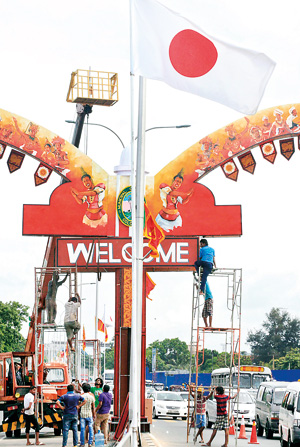News
Namo, Namo Lanka, Abe comes with deep gratitude
Japan hopes that Sri Lanka’s efforts at national reconciliation, such as expanding the mandate of the Presidential Commission of Inquiry on Missing Persons, will dispel concerns raised by resolutions at the UN Human Rights Council (UNHRC), Japanese Prime Minister Shinzo Abe said in an exclusive interview with the Sunday Times.

Prime Minister Shinzo Abe
Mr. Abe, who arrives today, said he was visiting Sri Lanka with feelings of gratitude to Sri Lanka for encouraging Japan’s return to the international community after World War II. The interview was conducted via email.
The Prime Minister avoided a direct question about the UNHRC’s ongoing investigation into allegations of war crimes and human rights abuses in Sri Lanka. “I understand that the Government of Sri Lanka is making constructive efforts for the development of national reconciliation, such as expanding the mandate of the Presidential Commission of Inquiry on Missing Persons,” he replied. “Japan hopes such efforts made by Sri Lanka will lead to dispel concerns indicated in the resolution by the UN Human Rights Council.” Mr. Abe said Japan would continue to provide assistance to Sri Lanka, including in the area of building the confidence of the international community in the country.
“For a long time, Japan has consistently strived for the development of peace in Sri Lanka and actively involved in and contributed to the peace process, with Yasushi Akashi, Representative of the Government of Japan, playing a major role,” he said. “Japan has also supported peace building in Sri Lanka after the end of the civil conflict and maintained its involvement in order to ensure the progress of national reconciliation. “With the end of the 30-year long civil conflict, I sincerely hope that in Sri Lanka, which showed Japan the spirit of tolerance 63 years ago, their people will once again demonstrate such spirit and realise a true national reconciliation,” he asserted.
Mr. Abe and First Lady Akie Abe will arrive at 12.45 p.m. today and leave at 9 a.m. tomorrow. Shortly after his arrival, the Prime Minister will unveil a plaque for the second phase of the Japanese-funded development of Bandaranaike International Airport. He will hold a bilateral meeting with President Mahinda Rajapaksa and visit Parliament.
The Prime Minister, who will be accompanied by a large business delegation, will also attend the Japan-Sri Lanka Business Forum meeting that precedes a banquet hosted for him by the President.

Sri Lanka is giving Japanese Prime Minister Shinzo Abe a grand welcome -- with the Katunayake-Colombo expressway and other roads being spruced up and decorated beautifully. Pic by Indika Handuwela
The First Lady will have her own schedule that includes a visit to the Carlton Preschool. They will both visit Kelaniya Raja Maha Vihara tomorrow before leaving. The first Japanese Prime Minister to visit Sri Lanka in 1957 was Mr. Abe’s grandfather Nobusuke Kishi. “Having heard that the tree my grandfather planted is still being carefully looked after in Peradeniya Botanical Garden in the ancient city of Kandy, I have since been dreaming of visiting Sri Lanka,” he reminisced.
Mr. Abe’s visit takes place 63 years after Sri Lanka refused to demand war reparations from Japan in a moving speech made by J.R. Jayewardene, the then Finance Minister in Prime Minister D.S. Senanayake’s Cabinet. Mr. Jayewardene recited the words of the Buddha —“Hatred ceases not by hatred, but by love”— at the San Francisco Peace Conference on September 6, 1951.
The Japanese Prime Minister observed that, by saying this phrase, it was Sri Lanka which encouraged his country’s return to the international community at a time when it was “trying to take a step forward to its reconstruction from its post-war devastation”. “Over 60 years since then, Japan as a peace-loving nation has contributed to world peace,” he said. “This time, I would like to visit Sri Lanka with feelings of gratitude towards them.”
When he met President Rajapaksa in Japan in March last year, they discussed strengthening their bilateral partnership beyond the 60th anniversary of diplomatic relations. “We, as friends of Sri Lanka, are delighted to contribute to its nation building together with the people of Sri Lanka, and we intend to continue to extend them high quality cooperation based on trust,” Mr. Abe pledged. The Prime Minister was asked what he considered to be the purpose of his visit at a time when Japan was losing the position of largest donor to archrival China. Sri Lanka’s most important development partner is today considered to be China. Many Japanese analysts have expressed concern about the “String of Pearls” strategy which refers to a network of Chinese military and commercial facilities and relationships along its sea lines of communication. They believe Sri Lanka to be part of this plan.
“Sri Lanka, which is located at a key point on the sea lanes of communication in the Indian Ocean, attracts growing interest due to its potential as an emerging country that has achieved economic growth of over seven per cent in recent years,” Mr. Abe replied, again declining to directly address the question. “I am confident that Japan and Sri Lanka, as maritime nations in Asia, have a relationship that enables them to further deepen and expand their cooperative ties as well as to grow together,” he said. “Being attracted by the beautiful nature and rich historical heritages, the number of Japanese tourists visiting Sri Lanka is rapidly increasing.”
“I would like to take this visit as an opportunity to reaffirm the historical amicable relationship with Sri Lanka, activate the private economic relationship more than ever, and elevate the bilateral relationship based on mutual understanding and trust to a higher level,” he said.

